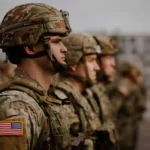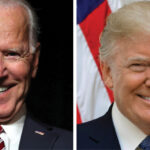On November 6, after a speech by Donald Trump in which he baselessly claimed the 2020 US presidential election was fraudulent, ABC journalist, Leigh Sales criticised what she saw as an outgoing president’s attempt to undermine the democratic process by tweeting “Robert Mugabe keeps coming to mind”.
And Sales was not the only one who compared Trump’s actions in the aftermath of the election to those of Zimbabwe’s former president. Samantha Power, Pulitzer-Prize winning author and former US ambassador to the UN, for example, also claimed on the same day that Trump was “going full-on Robert Mugabe”.
Many others made similar comparisons between Trump and African leaders on social media in the following days, expressing their surprise that election results can be contested in such a way in the United States, and implying that the president’s insistent refusal to concede to his rival is a move more fitting to democracies in Africa.
This is problematic for multiple reasons. First of all, it is an argument built on the false assumption that American democracy is not vulnerable to authoritarian interventions and power grabs like “lesser” democracies elsewhere in the world, and especially in Africa. It is an argument born out of America’s belief in its own moral superiority and its political class’s inherent racial biases.
On the surface, these may seem like harmless comparisons between political leaders with similar dictatorial tendencies. But why do so many choose to draw parallels between Donald Trump and African leaders when the recent history of the West itself is full of political leaders who have been as autocratic, as power-hungry, and as willing to undermine democratic procedures as their African counterparts? Was it not Western colonialism that paved the way for many of Africa’s democratic failures in the first place, anyway?
The current comparisons between Trump and authoritarian African leaders have a lot to do with the perceived moral superiority of whiteness in the US. White Americans, consciously or not, view themselves and their country as morally superior to others. As a result, when their president acts in a way that is objectively immoral and undemocratic, they find comfort in labelling that behaviour as something outside of whiteness by making comparisons between him and African leaders they accept as naturally morally inferior.
This problematic, and widespread, belief in the perpetual morality of whiteness can easily be seen in the coverage of atrocities committed by white assailants by the US media.
In 2013, for example, when a white student opened fire on other students at a middle school in Nevada, the media overwhelmingly portrayed him as a struggling child who had been bullied and cited the abuse he allegedly endured as a possible motivation for his actions.
And two years later, in 2015, when self-proclaimed racist Dylan Roof walked into a church in Charleston and shot nine African Americans dead, many media pundits repeatedly referred to him as someone who is “mentally ill”.
In 2018, a study by researchers from Ohio State University revealed that white shooters were 95 percent more likely to be described as “mentally ill” than Black shooters in news stories. The study also showed that “when shooters were framed in the media as mentally ill, 78 percent of white attackers were described as being victims of society – as being under a lot of stress, for example – versus only 17 percent of black shooters”.
The message here is clear – in the eyes of white America, white people are incapable of being inherently evil, and for them to commit atrocities, there must be some other phenomenon at play.
This belief that immoral, violent and unethical behaviours stand strictly outside the norms of whiteness is the reason why so many people are eager to compare Trump to African leaders and not explore the problems with the core dynamics of American democracy, including white supremacy, that resulted in such a person being elected president in the first place. It is, after all, easier to cast Trump’s actions as an “anomaly”, something that should have only been seen in Africa, than accept that he is, actually, a natural and typical product of American whiteness.
After an election official in Nevada voiced his concerns for the safety of his staff following the presidential election, for example, journalist Louise Milligan expressed her shock by tweeting “No, this did not happen in a far-flung tinpot regime, it did not happen in a banana republic.”
In this short tweet, Milligan clearly demonstrated that she, like many others in Western media and political circles, view election violence as something that is expected to happen in “banana republics” and “tinpot regimes”, terms often used to describe countries populated with people of colour, and not in America. While expressing her shock about the behaviour of Trump’s supporters, she implied that while such violence is out of the norm in the US, it is natural elsewhere in the world, perhaps in Latin America and Africa.
This is untrue. Just like it is the case in the US, election violence and tensions come on the back of specific political realities and democratic struggles in each country. There is no country in the world where the population is inherently wild and violence is a natural and expected part of the electoral process.
It is, however, not uncommon for white people in the West to hold such baseless beliefs about people living in “banana republics” and “far-flung tinpot regimes”. These views, often accepted by many as fact without much consideration, are a byproduct of the white supremacy that is at the core of Western civilisation, and American democracy.
White people are only able to view themselves, and their countries, as superior by casting others as inferior – intellectually, culturally and morally. When colonialists came to Africa, for example, they declared the indigenous inhabitants of the continent as morally and intellectually inferior to legitimise the invasion, exploitation and theft of their lands and resources. They also tried to legitimise slavery by claiming Black people were inferior to them, and as a result not deserving of basic human rights and dignity.
Comparisons that are currently being made between African nations and Trump’s America may seem trivial and unimportant, but they have real-world consequences. They attempt to cast Africa as the metric for violence and tyranny while masking intrinsic problems of American democracy that resulted in a white supremacist authoritarian occupying the White House. This is an attitude detrimental both for Africa and the US.
There is no perfect democracy either in Africa or the West. But if American media, politicians and pundits continue to act as if authoritarianism, tyranny and disrespect for democracy are concepts that are exclusive to Africa, or “banana republics” elsewhere in the world, they can never truly resolve the democratic crisis their country is currently experiencing.
Culled from Aljazeera

 Join Daily Trust WhatsApp Community For Quick Access To News and Happenings Around You.
Join Daily Trust WhatsApp Community For Quick Access To News and Happenings Around You.


